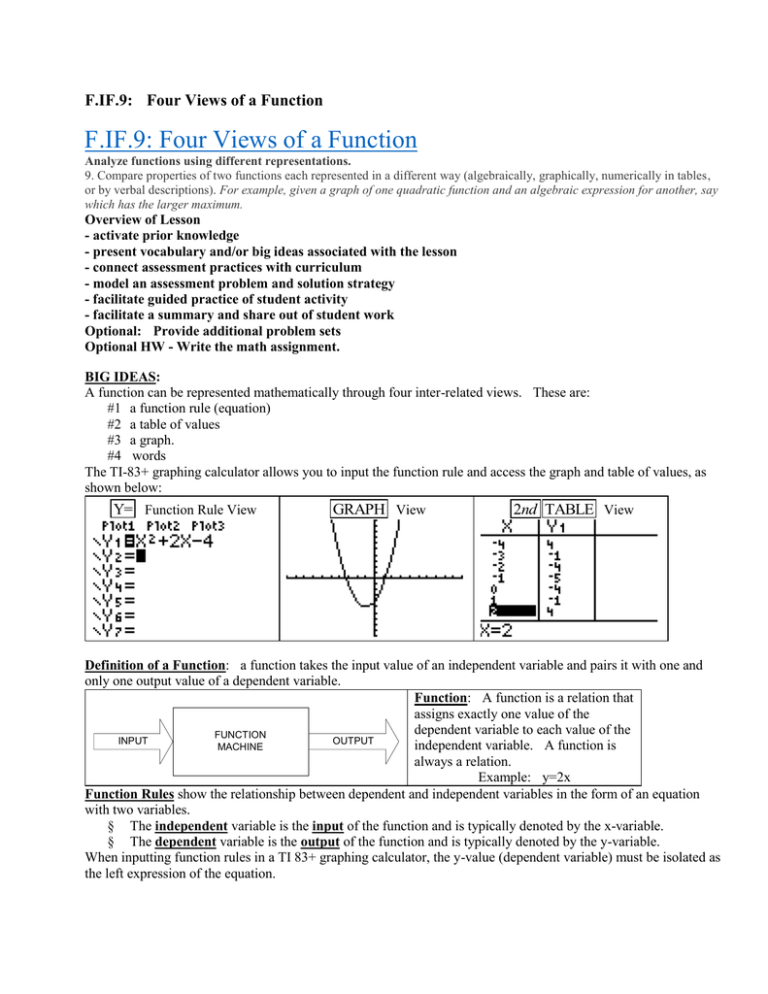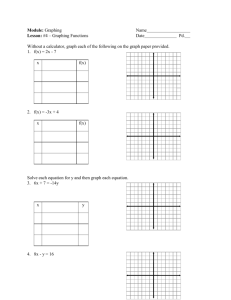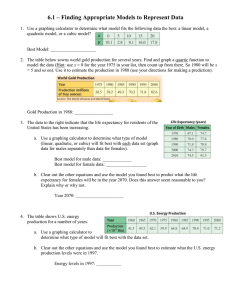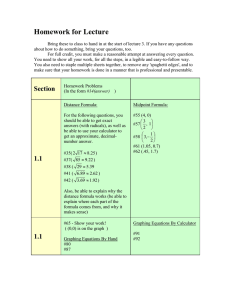F.IF.9: Four Views of a Function
advertisement

F.IF.9: Four Views of a Function F.IF.9: Four Views of a Function Analyze functions using different representations. 9. Compare properties of two functions each represented in a different way (algebraically, graphically, numerically in tables, or by verbal descriptions). For example, given a graph of one quadratic function and an algebraic expression for another, say which has the larger maximum. Overview of Lesson - activate prior knowledge - present vocabulary and/or big ideas associated with the lesson - connect assessment practices with curriculum - model an assessment problem and solution strategy - facilitate guided practice of student activity - facilitate a summary and share out of student work Optional: Provide additional problem sets Optional HW - Write the math assignment. BIG IDEAS: A function can be represented mathematically through four inter-related views. These are: #1 a function rule (equation) #2 a table of values #3 a graph. #4 words The TI-83+ graphing calculator allows you to input the function rule and access the graph and table of values, as shown below: Y= Function Rule View GRAPH View 2nd TABLE View Definition of a Function: a function takes the input value of an independent variable and pairs it with one and only one output value of a dependent variable. Function: A function is a relation that assigns exactly one value of the dependent variable to each value of the FUNCTION INPUT OUTPUT independent variable. A function is MACHINE always a relation. Example: y=2x Function Rules show the relationship between dependent and independent variables in the form of an equation with two variables. § The independent variable is the input of the function and is typically denoted by the x-variable. § The dependent variable is the output of the function and is typically denoted by the y-variable. When inputting function rules in a TI 83+ graphing calculator, the y-value (dependent variable) must be isolated as the left expression of the equation. Tables of Values show the relationship between dependent and independent variables in the form of a table with columns and rows: § The independent variable is the input of the function and is typically shown in the left column of a vertical table or the top row of a horizontal table. § The dependent variable is the output of the function and is typically shown in the right column of a vertical table or the bottom row of a horizontal table. Graphs show the relationship between dependent and independent variables in the form of line or curve on a coordinate plane: § The value of independent variable is the input of the function and is typically shown on the x-axis (horizontal axis) of the coordinate plane. § The value of the dependent variable is the output of the function and is typically shown on the y-axis (vertical axis) of the coordinate plane. REGENTS PROBLEMS 1. Given the following quadratic functions: and Which statement about these functions is true? a. Over the interval , the average c. The function has a greater maximum rate of change for is less than that for value than . . b. The y-intercept of is greater than the d. The sum of the roots of is greater y-intercept for . than the sum of the roots of . 2. Which quadratic function has the largest maximum? a. c. b. d. 3. Let f be the function represented by the graph below. Let g be a function such that Justify your answer. . Determine which function has the larger maximum value. F.IF.9: Four Views of a Function Answer Section 1. ANS: D Strategy: Each answer choice must be evaluated using a different strategy. a. Use the slope formula to find the rate of change for Statement a is false. The average rate of change for is more than that for . b. Compare the y-intercepts for both functions. The y-intercepts occur when x = 0. The y-intercept for g(x) = 6. The y-intercept for n(x) = 8 from the table. Statement b is false. The y-intercept of is less than the y-intercept for . c. Compare the maxima of both functions. The maxima of is 6. This can be found manually or with a graphing calculator. The maxima of n(x) = 9, which can be seen in the table. Statement c is false. The function has a smaller maximum value than . d. Compare the sum of the roots for both functions. The sum of the roots for g(x) = from a graphing calculator. The sum of the roots for n(x) = Statement d is true. The sum of the roots of from the table. is greater than the sum of the roots of . PTS: 2 REF: 081521ai NAT: F.IF.9 TOP: Graphing Quadratic Functions 2. ANS: C Strategy: Each answer choice needs to be evaluated for the largest maximum using a different strategy.. a) Input in a graphing calculator and find the maximum. The maximum for answer choice a is a little more than 6. b) The table shows that the maximum is a little more than 9. c) Input in a graphing calculator and find the maximum. The table of values shows that the maximum is 11 or more. d) The graph shows that the maximum is a little more than 4. Answer choice c is the best choice. PTS: 2 REF: 061514AI NAT: F.IF.9 TOP: Graphing Quadratic Functions 3. ANS: Function g has the larger maximum value. The maximum of function g is 11. The maximum of function f is 6. Strategy: Determine the maximum for f from the graph. Determine the maximum for g by inputting the function rule in a graphing calculator and inspecting the graph. The table of values shows the maximum for g is 11. Another way of finding the maximum for g is to use the axis of symmetry formula and the function rule, as follows: PTS: 2 REF: 081429a1 NAT: F.IF.9 TOP: Graphing Quadratic Functions START PART 1. PART 2. PART 3. PART 4. PART 5. PART 6. Standard “Writing the Math” Assignment Write your name, date, topic of lesson, and class on your paper. Copy the problem from the lesson and underline/highlight key words. State your understanding of what the problem is asking. Answer the problem. Explanation of strategy. Create a new problem that addresses the same mathematical understandings. State the answer to your new problem. Clearly label each of the six parts. Grading Rubric Each homework writing assignment is graded using a four-point rubric, as follows: Part 1. Statement of the problem. 1 point is awarded for correctly restating the 2 original problem. Part 2. Statement of what the problem is really asking. 1 point is awarded for correctly identifying 2 what the problem is asking you to find or do. Part 3. Solution to the problem. Part 4. Written analysis of the mathematics and solution strategy involved in the problem. Part 5. An alternative version of the problem. Part 6. Solution to the alternative version of the problem. 1 point is awarded for a correct solution to 2 the problem. Up to 1 point is awarded for an explanation of the mathematics and solution strategy involved in the problem. Up to 1 point is awarded for creating a new problem that involves similar mathematics and a similar solution strategy. 1 point is awarded for correctly solving the 2 new problem that you have created. This assignment/activity is designed to incorporate elements of Polya’s four step universal algorithm for problem solving with the idea that writing is thinking. Rationale for Assignment Each New York Regents Algebra I (Common Core) examination contains 13 open response problems. An analysis of the first three Algebra I examinations revealed that approximately 51% (20 out of 39) of these open response problems instructed students to: 1) describe; 2) state; 2) explain; 3) justify or otherwise write about their answers. It is theorized that students can benefit from explicit instruction and writing routines that are applicable to solving these problems. EXEMPLAR OF A WRITING THE MATH ASSIGNMENT Student’s Name Topic: Date: Class: Part 1. The Problem TOP Electronics is a small business with five employees. The mean (average) weekly salary for the five employees is $360. If the weekly salaries of four of the employees are $340, $340, $345, and $425, what is the salary of the fifth employee? Part 2. What is the problem asking? Find the salary of the fifth employee. Part 3. Answer The salary of the fifth employee is $350 per week. Part 4. Explanation of Strategy The arithmetic mean or average can be represented algebraically as: X x1 x2 ... xn n I put information from the problem into the formula. The problem says there are 5 employees, so n 5 . The problem also gives the mean (average) salary and the salaries of 4 of the employees. These numbers can be substituted into the formula as follows: 340 340 345 425 x5 5 1800 340 340 345 425 x5 360 1800 1450 x5 1800 1450 x5 350 x5 340 340 345 425 350 1800 360 Check: 360 5 5 Part 5. A New Problem Joseph took five math exams this grading period and his average score on all of the exams is 88. He remembers that he received test scores of 78, 87, 94, and 96 on four of the examinations, but he has lost one examination and cannot remember what he scored on it. What was Joseph’s score on the missing exam? Part 6. Answer to New Problem Joseph received a score of 85 on the missing examination. EVALUATION Name and Proper Heading Part 1. Problem copied correctly? Part 2. Understand the problem? Part 3. Correct and complete answer? 1/2 Point 1/2 Point 1/2 Point Part 4. Explanation of strategy. Part 5. New problem. Part 6. Solution to new problem. TOTAL 1 Point 1 Point 1/2 Point 4 Points


